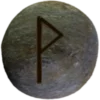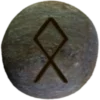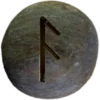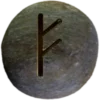Last Updated on March 10, 2025
Table of Contents



Symbolism and Meaning
The Wunjō, pronounced (WOON-yoh), Elder Futhark rune, sometimes called Wynn or Winya, symbolizes joy, harmony, and well-being. In Asatru, it represents a state of contentment and fulfillment that comes from aligning with the natural flow of life. This rune emphasizes the importance of a balanced and positive connection with oneself, others, and the world.
In the practice of Asatru, it serves as a reminder that true happiness comes from within. It teaches that external circumstances, while influential, do not define one’s inner state. Instead, the rune encourages cultivating a mindset of joy, regardless of external conditions. This focus on internal well-being resonates deeply within Asatru, where personal integrity and inner strength are highly valued.
Wunjō also represents the joy found in community and shared experiences. In Asatru, kinship and community bonds hold significant importance. It highlights the happiness that arises from these connections, whether through shared rituals, celebrations, or mutual support. It symbolizes the collective joy that strengthens the fabric of the community and fosters a sense of belonging.
When Wunjō appears in runic readings or meditations, it often signals a time of happiness, fulfillment, or the resolution of conflicts. It suggests that efforts to bring balance and harmony will bear fruit, leading to a period of peace and contentment. For those following Asatru, this rune can serve as a guide to focus on what brings genuine happiness and to prioritize those aspects of life.
Wunjō’s significance extends beyond simple joy; it represents a profound spiritual fulfillment. It is a reminder that true joy comes from living in harmony with oneself and the world. This rune, therefore, embodies the essence of well-being and the pursuit of a meaningful and joyous life within the Asatru tradition.
Runes Associated with Wunjō
The Gebō (ᚷ) and Ansuz (ᚨ) Elder Futhark runes connect closely to Wunjō (ᚹ). ![]()
Gebō represents gifts, partnerships, and harmony. It symbolizes the exchange of energy between people. The concept of reciprocity plays a key role in its meaning. True joy often arises from balanced relationships, much like Wunjō suggests. Gebō does not imply obligation but emphasizes mutual benefit. Its shape resembles two forces meeting in unity.
Ansuz signifies wisdom, communication, and divine inspiration. It aligns with Wunjō’s themes of clarity and understanding. Speech and insight bring joy, just as Wunjō represents fulfillment. Ansuz also connects to messages from higher knowledge. It teaches that wisdom enhances happiness. The ability to express truth creates harmony.
Together, Gebo and Ansuz strengthen Wunjō’s meaning. They highlight how connection and wisdom lead to deep joy. These runes remind us that true happiness comes from meaningful bonds and enlightened understanding.
Its Power in Asatru
Wunjō represents joy, harmony, and fulfillment. This rune symbolizes the deep happiness found in kinship, community, and personal achievement. It reflects a balance between inner peace and external success.
Asatruar see this rune as a sign of well-earned rewards. It signifies victory after struggle and the blessings of strong bonds. This rune encourages trust, fellowship, and shared prosperity. Many use it in rituals to attract joy and strengthen relationships.
In ancient times, Wunjō likely marked moments of triumph or unity. It reminded people to cherish happiness and remain grateful. Today, Asatruar view it as a guiding force for emotional well-being and harmony. Wunjō teaches that true joy comes from wisdom, perseverance, and connection.


